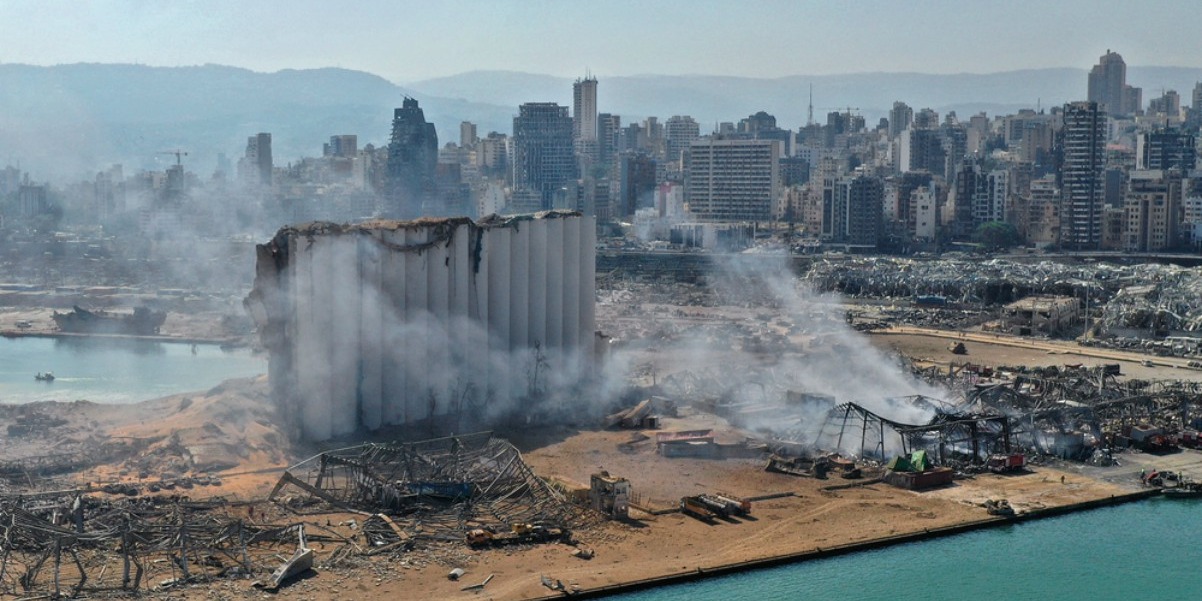After Lebanon's government resigns, Beirut left with few resources for recovery and almost no import capacity
The explosion in Beirut followed a prolonged financial crisis and will further deepen the recession, with the economy forecast to contract by a quarter this year.
The blast at the capital’s port on August 4 destroyed Lebanon’s key logistics hub, which handled 75% of imports. Over 160 people were killed, 6,000 wounded and 300,000 displaced from their homes. Damages are estimated at over $7 billion, equivalent to 14% of GDP in 2019, according to the Institute of International Finance (IIF), while the country’s short- and medium-term food security has been imperiled.
Lebanon had been going through economic dire straits prior to the disaster. In October 2019, nationwide demonstrations against the government led to a financial crisis, with banks restricting customer withdrawals through imposing informal capital controls. The Lebanese lira (LL), which is officially pegged to the U.S. dollar at LL1,507, started to depreciate, dropping by 80%, to reach over LL8,000 to the greenback in July. In March this year, the government defaulted on debt repayments for the first time, and is expected to default on $31 billion in outstanding Eurobonds. Debt has skyrocketed to $92 billion, equivalent to over 170% of GDP.
Due to the economic crisis, imports dropped by 44% this year to $56.9 million, according to Lebanese Customs Authority data. Volumes are nearly half that of 2016, at 2,245 tonnes.
The explosion destroyed grain silos with 15,000 tonnes of wheat. Lebanon produces just 16.9% of its wheat needs, with the rest imported, according to the U.N.’s Food and Agricultural Organization (FAO). While the country has agricultural potential, only 50% of arable land is used, according to FAO. Just 3% of GDP comes from agriculture, with the country importing an estimated 65% to 80% of its food needs.
Nearly all meat and fish is imported, and is halal-certified, with only chicken sourced locally due to an import tax of LL1,000 ($0.66 at official rates) per kilo, according to Dekerco, a meat and food importer in Beirut. An estimated three-quarters of the Lebanese population are Muslim.
Food prices however have increased exponentially due to inflation and foreign currency drying up, rising by 110% in July, according to the IIF. Over the past year, prices of key commodities like white beans, sunflower oil and rice have risen by 102%, 93%, and 88% respectively, according to a report by Triangle, a Beirut-based consultancy.
The percentage of income spent on food has sharply risen for the 45% of Lebanon’s 5 million population under the poverty line. For the 23% in upper poverty, it has risen from 31% in 2019 to 47%, while for the 22% living in extreme poverty, it has increased from 51% to 79%, according to Triangle figures. A further 1 million Syrian refugees in the country are also food insecure, relying on international aid agencies to survive.
“The last thing we needed was such a catastrophe after the economic meltdown. The country already had shortages, for many reasons, one due to a shortage of foreign currency, and this will continue,” said Laury Haytayan, a Beirut-based expert at the National Resource Institute, to Salaam Gateway.
Due to the financial crisis and the COVID-19 pandemic this year, Lebanon’s economy was projected to drop by 15% in 2020, but following the port explosion, is forecast to contract by 24%, to $33 billion, according to the IIF.
On Monday, the government resigned, plunging the country into further disarray.
With Beirut port destroyed, the country will have to rely on the much smaller port of Tripoli in the north for imports. Imports through Syria’s ports of Lattakia and Tartous are ruled out due to constraints from the ongoing conflict in the neighbouring country, and multilateral sanctions that prevent international trade from occurring.
While foreign governments have pledged to provide nearly $300 million in international aid to Lebanon, including food, it is considered a stop-gap measure given the economic damage of the explosion. The outlook for the country is bleak.
Inflows of foreign currency will drop further due to tourists shying away (tourism accounts for 7% of GDP), while remittances have also declined this year, which were estimated at $7.3 billion in 2019 (12.5% of GDP).
“Lebanon is in a situation where it does not have the resources to recover, not having the import capacity. Over the short- to medium-term we are looking at a strenuous situation. It is really a perfect storm,” said Sami Halabi, Director of Knowledge and co-founder of Triangle Consulting, to Salaam Gateway.
(Reporting by Paul Cochrane; Editing by Emmy Abdul Alim [email protected])
© SalaamGateway.com 2020 All Rights Reserved
